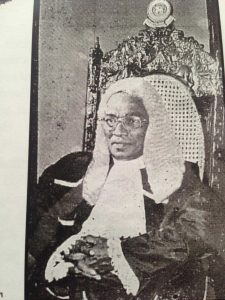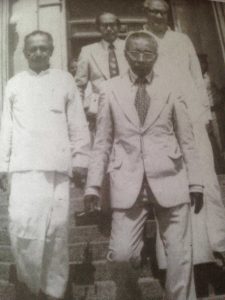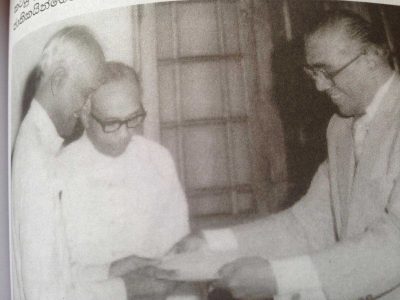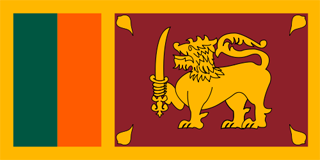BlogDeshamanya M.A.Bakeer Markar was Ceylonese, Deep In His Heart!
BY: M.R.M Fouzi
VISION OF BAKEER MARKAR

Late Deshamanya Alhaj Bakeer Markar
The reasons to commemorate the brilliant traits of a leader can be many, and lessons to be learnt from such leadership and foresight are often invaluable. The lessons learnt become the lasting legacy, which blossoms to be emulated in the future. This in a nutshell tells about the vision of late Deshamanya Alhaj Mohamed Abdul Bakeer Markar, about which we now think in terms of “Vision for an Inclusive Sri Lanka”. His peace building initiative was purely based on genuine consensus building. He lived Sri Lankan most, but remained an ardent Muslim.
I saw the former Speaker Bakeer Markar for the first time as the bridegroom, when he stepped into marry my eldest sister Sithy Kadija, the eldest daughter of Wairooshi Raffai. Then, I was a school boy just eleven years old.
THE ANCESTRY
The ancestry of Mohamed Abdul Bakeer Markar is traced to the early Arab traders. . The father of Bakeer Markar was Hakeem Alia Marikar Mohamed Marikar, who belonged to a family of physicians, whose ancestors too were physicians. M.A. Bakeer Markar was born on 12 May 1917.
EARLY EDUCATION
Bakeer Markar received his early education at St. Sebastian School in Hultsdorp, Colombo. At school, he excelled in the activities of the school literary society, displaying fine debating ability and becoming the best debater. As a student, his knowledge of Sinhala language surpassed many of his colleagues. In the friendly debate between St. Sebastian School and St. Mathews College, he was chosen to captain his school team, as the regular captain of the debating team failed to turn up. This was god given opportunity for the young boy Bakeer to display his debating prowess and he did remarkably well, making his team win in the debate. His school Principal remarked, “Like Bismarc saved Germany, our team was saved by Bakeer”. Here we see young Bakeer taking gentle initial steps; perhaps to accomplish great feats in the future!
Bakeer Markar received his early education at St. Sebastian School in Hultsdorp, Colombo. At school, he excelled in the activities of the school literary society, displaying fine debating ability and becoming the best debater. As a student, his knowledge of Sinhala language surpassed many of his colleagues. In the friendly debate between St. Sebastian School and St. Mathews College, he was chosen to captain his school team, as the regular captain of the debating team failed to turn up. This was god given opportunity for the young boy Bakeer to display his debating prowess and he did remarkably well, making his team win in the debate. His school Principal remarked, “Like Bismarck saved Germany, our team was saved by Bakeer”. Here we see young Bakeer taking gentle initial steps; perhaps to accomplish great feats in the future!
AT LAW COLLEGE
In 1939, he joined the Ceylon Law College to pursue his legal career. He would attend lectures in the morning and in the afternoon he worked as tuition master to keep ends meet. The World War II disrupted his studies, as schools as well as institutions were closed down for over two years. He had to enlist and serve in the ARP, which was part of the Civil Defence Service, after receiving training in Hyderabad, India. It was in 1949, he was able to resume his studies at Ceylon Law College. He passed out as a lawyer and commenced his legal practice at Kalutatra Bar in 1950.
GURU, Dr T.B. JAYAH
His initial steps into politics, was in 1946 when he was sub-warden at Zahira College, Colombo. Then Dr T.B. Jayah contested the Labour Leader A.E. Goonesinghe at the General Elections of 1946, to the State Council. Bakeer Markar was entrusted the task of carrying out Dr T.B.Jayah’s Election Campaign, which he carried out successfully. Dr T.B.Jayah was elected Member of the State Council. The Leadership of Dr.T.B. Jayah was laudable. In the State Council, Leader of the House Hon. S.W.R.D.Bandaranaike paying tribute to T.B.Jayaha’s contribution on the Soulbury Report said: “Credit for the attainment of independence should undoubtedly go to T.B.Jayah for his historic speech in passing the Dominion Bill”. With this kind of inspiration, experience and the taste of political nectar, Bakeer Markar pursued in the footsteps of his Political Guru Dr T.B.Jayah, to be elected member of the Maradana Ward of the Beruwala Urban Council, uncontested, in his very first attempt in 1949. This opened avenues for him to tread successfully in the wider political arena.
MATRIMONY
It was on 22nd May 1952 he got married to Sithy Kadija, the eldest daughter of Wairooshi Raffai. As the only living eyewitness of the incident that took place the day before the wedding, I wish to state the following facts, as the incident has been reported elsewhere, in a distorted manner.
The true position was that a discussion took place the day before the wedding when late A.W.M.Razick Marikar and late S.L.M. Shafie Marikar (cousins of the bridegroom) came to resolve the issue of the ‘Star’ with our father Wairooshi Raffai. Then three of us, my eldest brother M.R.M.Hamza, late Ahamed Sally Mama and I were the eye witnesses to the incident. During this time the whole compound of our ancestral house (the wedding house) was illuminated with large stars mounted on posts, giving a jubilant carnival atmosphere. Mr Razick Marikar and Mr Shafie Marikar showed displeasure as they supported the UNP candidate Mr P.A.Cooray and therefore requested that the illuminated ‘Stars’ be removed as the Star happened to be the symbol of the rival independent candidate Mr Batuwantudawe, whom our father supported. There was no utterance whatsoever by the bridegroom on the matter, as reported elsewhere. The matter was amicably settled and the illuminated ‘Stars’ were removed. The next day the bridegroom Bakeer Markar arrived to take the hand of the bride. However, to the amazement of the bridegroom and the guests, Wairooshi Raffai made sure that an illuminated star shone brilliantly, fixed to the large wooden trellis work at the bridegroom’s dining hall of our ancestral home.
When he was Chairman of the Beruwala Urban Council, Bakeer Markar owned his first vehicle, the two-door Bug Fiat, bearing registration number EY 1210. I wish to recall his travel in this vehicle to Colombo with his wife Sithy Kadija, to attend the Coronation Ceremony held at Colombo Town Hall, in honour of Queen Elizabeth II, when the Queen visited Ceylon in 1953.
SINHALA BAKEER
At Beruwala Urban Council, he was instrumental in moving the resolution to recognize Sinhala Language as the official language, which was voted by majority of the members. This was the first ever local government council to adopt such a resolution. Even at the All- Ceylon Muslim Organizations Conference, he earnestly propagated Sinhala language to be recognised as the Official language. In fact, for his stance, he was nick-named and affectionately called “Sinhala Bakeer”.
He was for the use of Sinhala language by the Muslims from his youth. As a Nation, Muslims must unite with the Sinhalese. In his own words “Though I belonged to the minority community, I was able to enter the national and international arena only because I was able to go forward with the majority community”. He was passionate in his noble thoughts. He believed in unity for the sake peace, coexistence and above all for the development of the nation, with Unity in Diversity. We are reminded of Prime Minister Dudley Senanayake’s precious words: “Ceylon belonged not only to the Buddhists but to anybody who claimed to be Ceylonese”.
His persevering efforts to serve the voters of Beruwala more effectively paid manifold dividends with his active participation and contribution made at the Delimitation Commission of Thalgodapitiya and Tittawala. As a result, the new electorate of Beruwala was carved out, composed of a mixed population of Buddhists, Christians and Muslims.
BAKEER MARKAR’S MAIDEN SPEECH IN PARLIAMENT
His was an illustrious Parliamentary career, from 1960 t0 1988, which was of enviable lustre. He commenced his Parliamentary career in March 1960, being elected Member of Parliament for the newly carved out Beruwala electorate. In his maiden speech on 22nd April 1960 on the Address of Thanks to the Throne Speech, he declared, “I should like to say that the Federal Party has been returned to Parliament not because the people wanted federalism but because the Federal Party made the members of the Sinhalese community seem monsters in the eyes of the Tamils”. He added, “We do not offer provocation to the Sinhalese”, only wish to live in harmony with the majority community. This was said in good faith to ensure that unity among all communities could prevail even at a later stage. We see that today. We now see the present Leader of the Opposition Hon. Sampanthan gracing the official Independence Day celebrations. We see them honour the National Flag and paying solemn attention to the singing of the National Anthem.
CEYLONESE IN OUTLOOK
Bakeer Markar always thought as a Ceylonese. In his address to Parliament on the Appropriation Bill on 24th August 1965 congratulating the Finance Minister Hon. Wanninayake, he said: “I should like to do it in a more unorthodox way because I think the man to be congratulated is the Hon. Prime Minister, for he chose as Minister of Finance, a person who is Ceylonese in every sense of the word”.
Again, speaking on the Special Allowance to Plantation Workers on 6th October 1965, he spoke on behalf of the estate workers, referring to them: “If we are Ceylonese, they are Ceylonese; if the Sinhalese are Ceylonese, they are Ceylonese; if the Muslims are Ceylonese, in the same way the estate Tamils are Ceylonese”. He believed and espoused the true spirit of equality to everyone.
These go to show his vision: One Identity under One Nation – Has his vision impacted positively on the citizenry? How far are we looking at his progressive outlook today?
VOICE OF THE PEOPLE SHOULD BE HEARD
Today, we have the GMOA protesting at the drop of a hat! Then the CGR making attempts for the pound of flesh! Teachers also try to join the fray. Aren’t the doctors and the public servants paid to serve the public? What Bakeer Markar said then has relevance even in today’s irrelevant turmoils. Speaking in Parliament, on 29th August 1967, at the Committee Stage of the Appropriation Bill, he said: “Talking about democracy and the democratic set up, it is our duty to examine and ascertain whether the voice of the people is heard at every level of the country’s governmental institutions”.
DEMOCRACY AT GRASSROOT LEVEL
Bakeer Markar made contributions even to the smooth and effective functioning of democracy at grass root level. During the Parliamentary debate on 13th June 1968, on the Establishment of District Councils, he submitted a memorandum to the Hon. Minister of Home Affairs and Rural Development, in which recommendations were proposed for changes to be introduced to the Provincial administration. He wanted Provincial administration to be reformed and reconstituted at District level, to give the much needed new look. He felt that District machinery should be under the supervision of the Member of Parliament, nominated by the Prime Minister. This was to form the basis of the District Coordinating Committee.
LANDMARK OF HIS POLITICAL CAREER
His victory at the General Elections of 1977 was the dazzling landmark of his political career. At this General Elections, he was returned with a remarkable majority of 27000 votes, with a total poll of 49,000 votes. His nearest rival R.G.Samaranayake was placed far below with 22,000 votes. This electoral victory of 1977 was a historic gift to the respectful minority. I am proud to say that I was an active campaigner of his glorious victory. There were 14 contestants, of which 12 were non-Muslims. Other two, being himself and another wealthy gem merchant of Beruwala , who lavishly spend on his campaign.

Hon Speaker Bakeer Markar with Hon Anandatissa and Hon Sivasithaparam
It was on 4thAugust 1977, he was elected Hon. Deputy Speaker. This was a short stint. He was thereafter elected to the high Office of Speaker on 21st September 1978, being the unanimous choice of the Government and the Opposition. His name was proposed by Hon. Anandatissa De Alwis, Minister of State and seconded by Hon. M. Sivasithamparam, Member of Parliament for Nallur. In the words of the proposer Hon. Anandatissa De Alwis: “It is a tribute to your popularity among Members, in which you are unrivalled”. In the words of the seconder: “You have one great advantage in that you understand all three languages”. This exalted position was held in high esteem by the Speaker M.A. Bakeer Markar from the time he was elected Speaker up to the time of his resignation on 31st August 1983. He was the last Speaker of the old Parliament at Galle Face and the first Speaker of the new Parliament in Sri Jayawardenapura.
DECORUM OF SPEAKER’S OFFICE
On his elevation to the position of Speaker, he stood by the great traditions and decorum of the Speaker’s Office. He did not want to be a nominal Speaker, merely presiding at Parliamentary Sessions. The Office of Speaker was made most significant. The Mace was not any more mere symbolic, placed long before the entry of the Speaker to the Chamber of the Parliament. The Speaker’s Mace was made the due symbol of authority, being carried with solemnity by the Sergeant-at-Arms and placed at the appropriate place, as the Speaker came to preside at the Parliamentary Sessions. The Speaker’s traditional robe was reintroduced, which to this day has its glamour. We have seen the majestic appearance of the Hon. Speaker and witness this being continued to this day. Dignity was restored and redefined to the Speaker’s office during his tenure. Above all, Speaker Bakeer Markar saw to it that the annual audit of the Parliamentary administration was brought under the direct supervision of the Auditor General, making Parliament affairs and administration transparent. It is only hilarious and ironical that we see today the unruly behaviour of some Members of Parliament inside the well of the Parliament, attempting to grab the Mace and run away.
NOVEL FEATURE

Hon Minister V.L. Wijemanne taking oaths as Acting Minister in the presence of Speaker Bakeer Markar
A novel constitutional aspect of his Parliamentary career was, when he was Hon. Speaker, he had the rare privilege of presiding at the Oath-Taking Ceremony of two Cabinet Ministers and as such handed over acting Ministerial appointments to Hon. V.L.Wijemanne and Hon. A.R.M.Attanayake, as acting Minister of Plantation Industries and Minister of Higher Education respectively, whilst President Jaywardena and Prime Minister Premadasa were simultaneously away from the country in1981,to attend the Royal Wedding of Prince Charles and Lady Diana.
GOOD WILL AMBASSADOR
Another facet which dazzled the Speaker’s Office, while holding office, was the series of overseas official trips, which he undertook as Speaker of Parliament. He maintained excellent rapport with the diplomatic community. He entertained and accepted such official invitations only from his counterparts in other countries. If any country did not have the Office of Speaker, invitations from those countries have to come from the Head of State of the respective country. He was honoured with official invitations to Malaysia and attended the Inter-Parliamentary Conference in Lisbon, Portugal in 1978. In 1979, he made a state visit to Iraq, where he addressed the Iraq’s Parliament as State guest. The close relationship with Iraq enabled him to build the “Saddam Hussein Village”, in the Eastern Province. He made official visits to Indonesia and Philippines in 1980. He attended the Maldives Republic Day in Male in the year 1981. He was also the President’s official representative at Anver Sadaat’s funeral in Cairo, Egypt in 1981.He made official visits to United Kingdom, India and Bangladesh in 1981. He also made an official visit to South Korea and Havana, Cuba in 1982. He was in Rome, Italy in 1983. He attended the Peace Conference in Soviet Union in 1986. Thus, he was goodwill ambassador, while being the Speaker of Parliament, binding strong ties of international relations. His diplomatic initiatives paid dividends to the Nation!
IT WAS NOT A FALL BUT A POLITICAL JOSTLE!
Permit me to say that Speaker Bakeer Markar was compelled to resign on 31st August 1983, during the time when our country was in communal turmoil. We like it or not; that was the reality! When he resigned, His Excellency President Jayawardena assured to him that there was going to be a Second Chamber and Bakeer Markar would be made Chairman of that Second Chamber and other promises too. This probably was one of the few wild dreams of President Jayawardena. To save face, President Jayawardena appointed Bakeer Markar as Minister without Portfolio on 31st August 1983, which position he resigned on 31st June 1988.There after he served as the Governor of the Southern Province from 31st June 1988 to 21st December 1993.
Whatever position was entrusted, as one of the pioneer members of the United National Party, Bakeer Markar had been sincere and loyal to the Party. Both in Urban Council politics and the wider arena of national politics, he remained most faithful to his Party, which made him out, to be an honest political figure. We are made to ponder, whether his tremendous commitment to serve the Nation was cut-short by political manipulations!
We are reminded of Speaker Bakeer Markar’s prodigy Imthiaz Bakeer Markar, who is equally loyal to his Political Party and is at the helm of promoting peace, reconciliation, integration and unity among all communities in Sri Lanka.
FAREWELL SPEECH IN PARLIAMENT
In his farewell speech in Parliament on 9th June 1988, he declared “I am proud to be a Sri Lankan, for here in Sri Lanka a man can freely worship God in his accustomed fashion”. He strongly believed in reconciliation and coexistence. But soon we find the sad tone in his address to Parliament. He poured out, when he said: “It is my regret that I shall no longer be with you when you add chapter to shining chapter in Sri Lanka’s history”. He dreamt further, when he said “the time is not far off when Ceylon will sit in the Assembly of Nations, as a well- developed country and take its rightful place there and play its role”. All these go to show that Deshamaya Bakeer Markar was Sri Lankan, deep in his heart, and was a Leader with the sincere message to all of us, Buddhists, Christians, Hindus and Muslims to think – Sri Lankan.
Let me end with the words of Bismarck, who said “Politics is the art of the possible, the attainable – the art of the next best”. This is food for thought!

